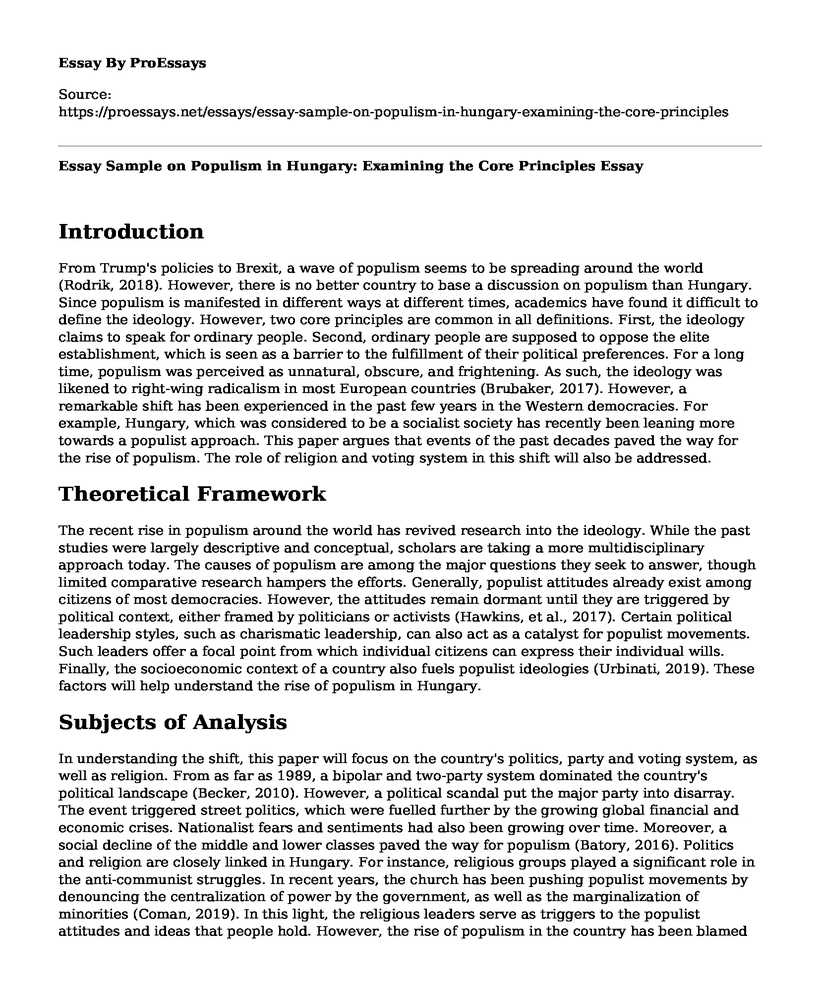Introduction
From Trump's policies to Brexit, a wave of populism seems to be spreading around the world (Rodrik, 2018). However, there is no better country to base a discussion on populism than Hungary. Since populism is manifested in different ways at different times, academics have found it difficult to define the ideology. However, two core principles are common in all definitions. First, the ideology claims to speak for ordinary people. Second, ordinary people are supposed to oppose the elite establishment, which is seen as a barrier to the fulfillment of their political preferences. For a long time, populism was perceived as unnatural, obscure, and frightening. As such, the ideology was likened to right-wing radicalism in most European countries (Brubaker, 2017). However, a remarkable shift has been experienced in the past few years in the Western democracies. For example, Hungary, which was considered to be a socialist society has recently been leaning more towards a populist approach. This paper argues that events of the past decades paved the way for the rise of populism. The role of religion and voting system in this shift will also be addressed.
Theoretical Framework
The recent rise in populism around the world has revived research into the ideology. While the past studies were largely descriptive and conceptual, scholars are taking a more multidisciplinary approach today. The causes of populism are among the major questions they seek to answer, though limited comparative research hampers the efforts. Generally, populist attitudes already exist among citizens of most democracies. However, the attitudes remain dormant until they are triggered by political context, either framed by politicians or activists (Hawkins, et al., 2017). Certain political leadership styles, such as charismatic leadership, can also act as a catalyst for populist movements. Such leaders offer a focal point from which individual citizens can express their individual wills. Finally, the socioeconomic context of a country also fuels populist ideologies (Urbinati, 2019). These factors will help understand the rise of populism in Hungary.
Subjects of Analysis
In understanding the shift, this paper will focus on the country's politics, party and voting system, as well as religion. From as far as 1989, a bipolar and two-party system dominated the country's political landscape (Becker, 2010). However, a political scandal put the major party into disarray. The event triggered street politics, which were fuelled further by the growing global financial and economic crises. Nationalist fears and sentiments had also been growing over time. Moreover, a social decline of the middle and lower classes paved the way for populism (Batory, 2016). Politics and religion are closely linked in Hungary. For instance, religious groups played a significant role in the anti-communist struggles. In recent years, the church has been pushing populist movements by denouncing the centralization of power by the government, as well as the marginalization of minorities (Coman, 2019). In this light, the religious leaders serve as triggers to the populist attitudes and ideas that people hold. However, the rise of populism in the country has been blamed for destroying political representation in the country (Szente, 2019). The country's voting system has been repressive, a factor that has also fanned the populist sentiments (Beauchamp, 2018).
Conclusion
Just like in other countries around the world, populism has been on the rise in Hungary. The shift has been informed by various political, social, and religious events. The country's voting system that represses democracy has led to these sentiments. Religious groups have opposed the government fuelling them further. Moreover, the decline of the middle and lower classes has played a huge role.
Reference List
Batory, A., 2016. Populists in government? Hungary's "system of national cooperation". Democratization, 23(2), pp. 283-303.
Beauchamp, Z., 2018. It happened there: how democracy died in Hungary. [Online] Available at: https://www.vox.com/policy-and-politics/2018/9/13/17823488/hungary-democracy-authoritarianism-trump[Accessed 25 January 2020].
Becker, J., 2010. The rise of right-wing populism in Hungary. SEER: Journal for Labour and Social Affairs in Eastern Europe, pp. 29-40.
Brubaker, R., 2017. Why populism?. Theory and Society, 46(5), pp. 357-385.
Coman, J., 2019. The pastor versus the populist: Hungary's new faith faultline. [Online] Available at: https://www.theguardian.com/world/2019/dec/29/pastor-v-populist-viktor-orban-hungary-faith-faultline[Accessed 25 February 2020].
Hawkins, K., Read, M. & Pauwels, T., 2017. Populism and its causes. The Oxford handbook of populism, pp. 267-286.
Rodrik, D., 2018. Populism and the Economics of Globalization. Journal of international business policy, 1(1-2), pp. 12-33.
Szente, Z., 2019. How Populism Destroys Political Representation (Anti-) Parliamentary Reforms in Hungary after 2010. DPCE Online, 39(2).Urbinati, N., 2019. Political theory of populism. Annual Review of Political Science, Volume 22, pp. 111-127.
Cite this page
Essay Sample on Populism in Hungary: Examining the Core Principles. (2023, Apr 10). Retrieved from https://proessays.net/essays/essay-sample-on-populism-in-hungary-examining-the-core-principles
If you are the original author of this essay and no longer wish to have it published on the ProEssays website, please click below to request its removal:
- Research Paper on American Jury System
- Research Paper on Democracy and Dictatorship
- Research Paper on Fed Monetary Policy: Structure & Effects on US Economy
- Dem Soc: Political Democracy in a Socialist Market Economy - Essay Sample
- Essay Sample on Intertextuality, BLM, Injustice: A Speech of Hope and Change
- Essay Sample on Brexit's Impact on the British Fashion Industry
- Free Paper Sample on Missouri Human Rights Act vs Fair Standard Act







